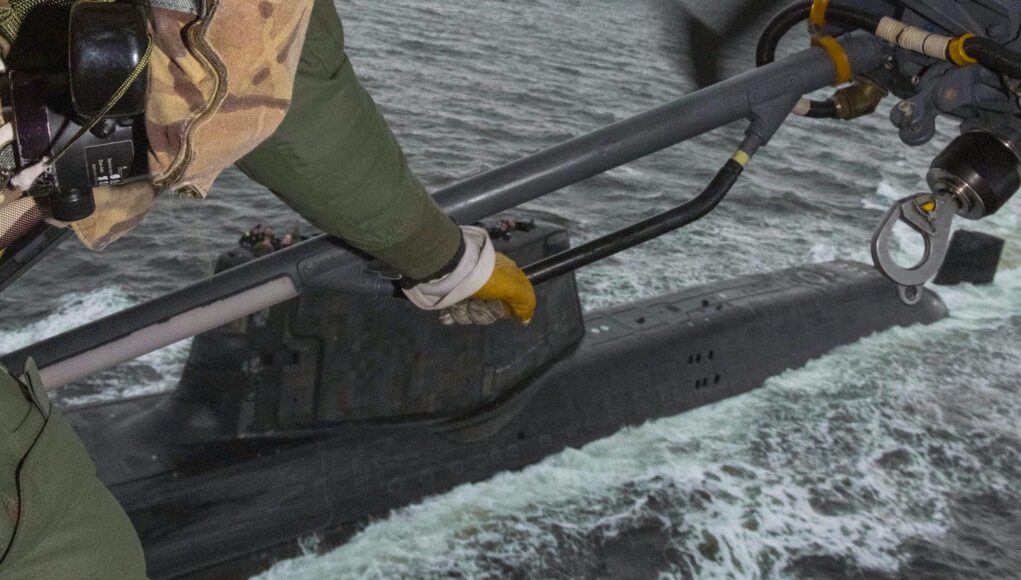A recent article published by Plymouth Plus, titled “Disaster as broken £1 billion nuclear submarine arrives in Plymouth,” has prompted serious discussion within defence circles — not because of whether its central claims are true or false, but because of how the story was constructed: through a combination of unattributed sourcing, unacknowledged edits, and factual inconsistencies that raise questions about editorial process.
The report, which states that the Royal Navy’s HMS Astute arrived with a potentially serious reactor fault, relies on a single unnamed “defence source” and provides no supporting comment from officials, contractors, or independent experts.
Anonymous sources are a valid tool in defence reporting — particularly where security or whistleblowing is involved — but the way in which this story combines unverifiable sourcing, publicly circulating content, and undisclosed changes post-publication has triggered understandable concerns about transparency.
The article’s central allegations — that HMS Astute was towed into Devonport with significant technical issues and may have had armaments removed beforehand — are certainly serious. However, the language, timing, and even some of the phrasing closely match a social media post shared shortly before the piece went live. That post was published by an account with no verifiable defence credentials or professional background in the field.
That same account posted footage of the submarine arriving in full daylight. Yet both it and the original version of the article claimed the arrival happened “under the cover of darkness” — a point that was later amended to “under the cover of dawn,” with no accompanying correction or editorial note. This unannounced change highlights broader concerns around how facts were established and updated.
The footage used by Plymouth Plus also appears to originate from the same location, captured at the same time, and under identical conditions as the social media video — suggesting a possible overlap between the outlet’s source and the online user, or a reliance on publicly available footage without attribution. Either scenario raises reasonable questions about the sourcing chain and the editorial process used to verify it.
When claims about nuclear submarine safety are made, the public has a right to understand the origin of that information. Was it shared by a qualified insider — or sourced from general online commentary?
Transparency, Not Just Attribution
Again, the issue is not anonymity itself. Rather, it’s the lack of disclosed verification, unclear editorial standards, and subsequent revisions without explanation that draw concern.
Responsible reporting with anonymous sources usually includes details on why anonymity was granted, what kind of role the source holds, and how their information was cross-checked. None of that context is provided in this case, and the story’s strong alignment with online speculation adds to the lack of clarity.
Additionally, Plymouth Plus has revised key phrases in the article since publication. For example, “under the cover of darkness” was replaced with “under the cover of dawn,” and “Rolls-Royce engineers were seen observing the arrival” was softened to “reportedly seen.” These changes — made without any public correction or footnote — alter the tone and certainty of the claims, which can affect how readers interpret the piece’s reliability.
Industry norms typically call for an editor’s note or correction notice when a published article is updated in this way. The absence of such transparency here is, in itself, cause for concern.
A Reversal of Journalistic Responsibility
When we asked the person running the outlet about these concerns on Twitter, Plymouth Plus replied:
“Plymouth Plus is trusted by local people and backed by verified facts. Our content has amassed over 20 million views in less than 6 months and we maintain one of the largest and most engaged followings in the city. It’s disappointing, though not surprising, to see yet another attempt to undermine credible local journalism by someone with a long track record of criticising the media rather than spending their time reporting themselves.
Instead of resorting to tired accusations about ‘sourcing integrity’ that don’t hold up to scrutiny, perhaps you should take the time to investigate the matter yourself and produce evidence that disproves our reporting.
When you do, we’ll be the first to apologise — but you won’t, because there’s nothing to find. In the meantime, we actually have a job to do — covering real stories for the people of this city — so we won’t be engaging in this kind of childish distraction any further.”
This response highlights a number of points — not least the emphasis on audience size and engagement metrics, which, while impressive, are not equivalent to editorial transparency or factual verification.
- First, the reference to “20 million views” appears to reflect the popularity of short-form video content, rather than substantiated investigative reporting. High engagement is valuable — but it does not, in itself, demonstrate the accuracy of specific claims.
- Second, the idea that critics must “produce evidence” to disprove a published article reverses a core principle of responsible journalism: that the burden of proof lies with the publisher, especially when the reporting involves serious allegations.
- Finally, characterising valid questions about sourcing, edits, and verification as a “childish distraction” sidesteps the real issue:
- Why do key elements of the article mirror a non-expert social media post?
- Were any of the claims independently verified?
- Why were factual edits made after publication with no correction notice?
Raising these concerns is not an attempt to discredit local journalism — it’s a matter of professional accountability. When public trust is at stake, especially in defence reporting, transparency isn’t optional.
The Bottom Line
To be clear, no newsroom is perfect. We ourselves recently corrected an error involving the timing of a U.S. submarine’s deployment. When it was brought to our attention, we issued a transparent update — because that’s how credible journalism handles its responsibilities.
If there is indeed a technical or safety issue with HMS Astute, that story deserves to be told — and investigated thoroughly. But it must be reported with proper sourcing, editorial transparency, and clear separation between public speculation and verifiable fact.
When online commentary is repackaged as anonymous reporting, and when questions are met with edits and dismissals rather than openness, it doesn’t just affect one article — it risks undermining public confidence in journalism, institutions, and the truth itself.et with deflection rather than clarity, the result is a weakening of public trust — in journalism, in institutions, and in the truth itself.














the Media has the potential to be as destructive as an enemy of is cheap quick to produce and in a digital format can be more destructive, but, only when it is used responsibly which is why a big brother concert makes sense media censorship would be grossly unpopular, but when the nations safety and security is threatened by it’s misuse. then things to prevent it 😒 happening must be in place legislation to punish irresponsible reporting.
why astute (or Astute?) r
great
“Plymouth Plus proves why astute (or Astute?) reporting still matters” Clever pun, whther intended or not. 👍😁
Indeed USAF-well spotted 🙂 Great article George-nice to see the site hopefully secured again!
sad
I always thought the correction/apology must cover the same pages and size as the original article in newspapers and that should be the standard.
Now how you work that will internet media is different but should be workable.
Code of practice for editors, usually ignored
There are several mainstream media outlets that have refused to sign up to IPSO or any other independent regulator, including The Guardian, The Independent, and the Financial Times. Not surprised at the first two, as they’d be inundated. The moderation of the Guardian comment section is ridiculous too. Years ago when I used to contribute, I had multiple very tame, completely uncontroversial comments removed with very little explanation. The one time I queried why and I was told that the use of the term “swarmed” in reference to people was dehumanising, whilst at the same time hundreds of vitriolic comments on the same article, and hundreds of other articles, referring to people by genuinely dehumanising language were left unmoderated, sometimes with ‘guardian picks’ and hundreds of upticks. It genuinely felt scary how partisan the moderation was, and eye opening for someone who had always considered themselves to be in the political centre.
You really think that referring to refugees and asylum seekers as a “swarm” isn’t a problem?
The ward definitely has a derogatory tone, but then that is why you used it I expect.
This kind of behaviour is just discusting, reporting unsubstantiated claims and then telling critics to ‘do your own reseach’ and throw insults (thinly veiled or otherwise) when challenged is the mark of a conspiracy theorist or an outrage merchant not a respecatble source of information
Sensationalist stories planted to destabilise and “stir sh*t up.”
Who’d have thought it!?
I dug into this some more and found the original source for this to be a twitter user who claims to be an activist from Lebanon who now lives in Plymouth. However while their account is old it’s only been active for about a year. And their profile picture shows a selfie in front of smearing tower in Plymouth. However when you actually look more closely you can see the windows of the tower don’t match the real thing so it’s definitely AI generated.
This has all the hallmarks of a foreign disinformation campaign. Where you create a fake news website and fill it with their own fake sources. Some of it will be real for legitimacy sake. But most of it will be to sow discontent and rumours designed to lose trust in institutions.
I think must news agencies put a few extra ingredients in to take one part or the other.inventing fake news should be considered a crime but then our government does it every day.
TBH fake news organisations like Plymouth Plus aren’t uncommon. Some are run by grifters, some by conspiracy theorists, and others by Russian disinformation organisations. What is guaranteed is sensationalist stories without creditable references designed to undermine faith in the state.